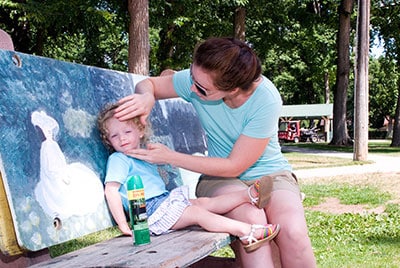Detect & Prevent Vector-Borne Diseases

The Division of Vector-Borne Diseases (DVBD) works to detect and prevent diseases spread by mosquitoes, ticks, and fleas.
- Quickly detects and monitors threats by working with health departments to monitor vector-borne diseases
- Develops vaccines and pest control methods to protect people and animals
Vaccine Work
DVBD staff work on developing vaccines for vector-borne diseases.
- Staff have developed a dengue vaccine candidate, TDV, that is being clinically evaluated in multiple countries for safety and efficacy. Phase I and Phase II trials showed that the vaccine candidate was safe, well-tolerated, produced antibody levels to protect against all four dengue viruses, and provoked an adequate immune response. Recent Phase III trials (conducted and reported by Takeda Vaccine) showed promising outcomes with continued long-term protection against hospitalization and symptomatic dengue illness through 4.5 years of the trials.
- Staff are also working on the development of two types of Zika vaccines. These vaccines are in different phases of development.
In addition to developing vaccines, DVBD staff also develop recommendations for the use of vaccines once they are approved by the Food and Drug Administration. In February 2022, staff lead a working group to develop recommendations for the use of tick-borne encephalitis vaccine among travelers and laboratory workers that was unanimously approved by the Advisory Committee of Immunization Practices. Staff are also leading discussions on the development of recommendations for the use of a chikungunya vaccine for persons at risk in the United States.
Once the vaccines are licensed and have approved recommendations, DVBD staff assist in rolling out vaccines to at-risk individuals (e.g., dengue vaccine in Puerto Rico, yellow fever vaccine in Africa), monitor the safety (e.g., follow-up on reports of serious adverse events or clusters of unusual events), and evaluate immunogenicity (e.g., conduct studies to look at potential interference between vaccines and determine if booster doses of vaccines are needed).
Discover Breakthrough Pest Control
Nootkatone is an essential oil found in Alaska yellow cedar trees, some herbs, and citrus fruits. It can also be produced through sustainable, industrial-scale fermentation. Nootkatone is widely used in the fragrance industry and is prized for its distinct, fresh, citrus scent. DVBD holds three patents on nootkatone and is working with Evolva, our exclusively licensed commercial partner, to evaluate and develop next-generation pest control products.
Nootkatone appears to kill biting pests, including mosquitoes and ticks, in a unique way, different from other insecticides already registered by the US Environmental Protection Agency. This could help in the fight against mosquitoes that have become resistant to current insecticides. Learn more and watch a video.